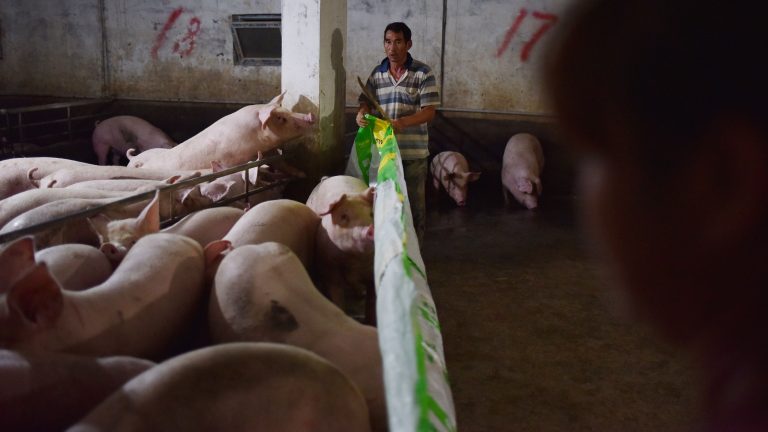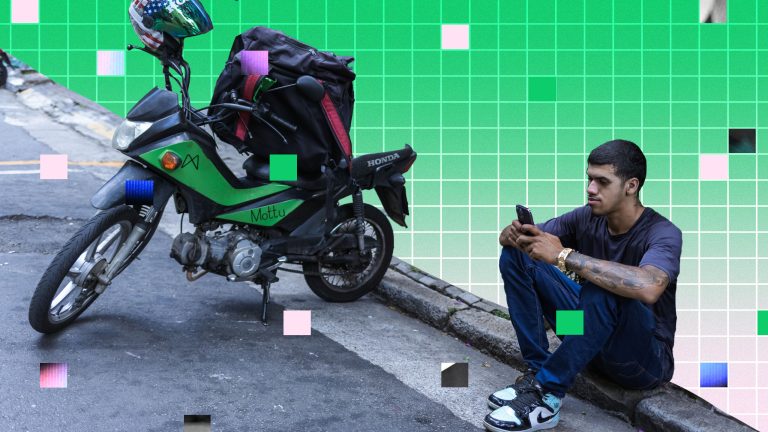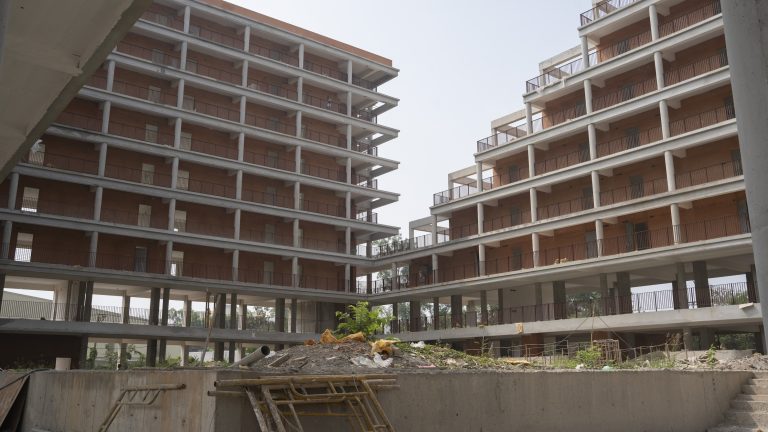Megacities like Chongqing and Shenzhen are symbols of China’s staggering economic rise over the past two decades. As the country’s manufacturing and technology industries boomed, hundreds of millions of people left their rural homes and migrated to urban areas, seeking to escape poverty and participate in the burgeoning consumer economy. But as Xiaowei Wang writes in their new book, cities don’t account for all the ways China is transforming.
In Blockchain Chicken Farm, Wang travels through China’s rural communities and discovers emerging technologies are greatly altering life in the countryside, where 40% of the population still lives. Wang says they felt pulled to rural China after visiting villages in the southern province of Guizhou, and also because they felt the need to challenge their own “metronormativity.” The wonky term — an echo of the word heteronormativity — was coined by queer theorist Jack Halberstam. It’s the pervasive idea, Wang writes, that “rural people are backward, conservative, and intolerant” and that cities are the only places to live in freedom.
Wang says that confronting the world’s collective metronormativity is “crucial” and will ultimately “determine our shared future.” Around the world, right-wing populism is on the rise, fueled by the forces of globalization. But it’s rural areas that make globalized cities possible in the first place, supplying the food, resources, and even the data to train artificial intelligence. The rural-urban divide is only a cultural illusion, and one that can be overcome. Wang invites readers to fight authoritarianism by demanding “something outside the strict binaries of rural versus urban, natural versus man-made, digital versus physical, and remote as disengaged versus metropolitan as connected.”
Readers of Blockchain Chicken Farm meet a series of confounding subjects who look nothing like the stereotypes of Chinese peasants toiling in picturesque rice paddies. There’s Jiang, the farmer who raises the free-range chickens the book is named after, and which, he notes, aren’t very smart or brave. If you leave them outside at night, they will crowd around lights, killing one another in “a kind of chicken stampede,” he tells Wang.
The project, dubbed GoGoChicken, is a partnership between the local village government and start-up Lianmo Technology. In China, food safety is a serious concern; buyers want to know a free-range chicken is what it claims to be. Jiang outfits the birds with ankle monitors that track their location and the number of steps they take. Consumers can scan a QR code on the side of the devices, which contains information like the bird’s weight and its photograph. Lianmo uses blockchain technology to ensure the data is secure and genuine.
The operation sounds high-tech, but it’s not clear how it will work out. The year it launched, Lianmo preordered 6,000 free-range chickens from Jiang, which sold for up to $40 each on JD.com and other shopping sites. The next year, there was no such order, and Jiang was left on his own. Throughout the book, Wang carefully documents the many unanswered questions posed by new technologies, making it clear that our shared future remains anything but certain.
Rest of World spoke with Xiaowei about their new book in late October. The following interview has been edited and condensed for clarity.

Can you tell me what it was like to visit Jiang’s farm? Had you ever been somewhere like it before?
It was a perfectly beautiful free-range chicken farm! But it got really awkward because I asked the county official, who was very excited to show me around, “What do you think about blockchain?” And he thought I was making fun of him because he didn’t know what blockchain was. I asked the farmer, and he was like, “What are you talking about?” They were obviously trying really hard, and I think the project did bring in a lot of income.
One of the most interesting themes you discuss is China’s continued reliance on small farms and farmers, like Jiang. It’s a stark contrast to the United States, where large industrial-farming enterprises are the norm.
China has this patchwork of small farms, and it’s a real struggle. The country is part of the World Trade Organization, which requires it to adhere to a series of agricultural agreements and stipulations — you need to produce a certain amount of tomatoes for export or whatever. Small farmers can typically grow enough to feed their family, and maybe sell a small surplus at the local market, but they can’t reach the scale necessary for market capitalism. But at the same time, if everyone stopped farming in China and moved to the city, as we’ve seen over the past ten or so years, the government wouldn’t be excited about that either. It’s a very precarious situation.
You write that “an industrial pig farm is more like an iPhone factory than a bucolic countryside haven.” Can you expound a little on what you mean by that? Why is a tech giant like Alibaba interested in pig farming?
People have now engineered the perfect pig. We pretty much use only three very specific breeds for factory-farm hogs. Hundreds of thousands of these pigs live on a farm, and you have surveillance cameras monitoring them. Biosecurity is actually this huge part of industrial pig farming. If you have any bit of bacteria — it could be some crumbs under your nails, for example — and that gets into the farm, it’s going to just tear through the pigs because they live in such close quarters. In fact, we have already seen this happen with African Swine Fever, which caused a pork shortage in China.
Alibaba is trying to optimize industrial pig farming by minimizing the amount of human labor that’s needed. Right now, it’s people who watch these hogs, but Alibaba wants computer vision and AI to help. They have other AI farming products as well, for example, to help farmers know when to pick melons so they’re optimized to be as sweet as possible.
You use the term “metronormativity” in your book and say that confronting it will “determine our shared future.” What do you mean by that?
A lot of scholars say, Well, how do you really define what is urban? In rural areas in China and the United States, there’s a lot of what appears to be urban going on, like GPS tractors and all these other high-tech things. I came to the realization that “urban development” — going into a rural area and saying, We have to economically develop this place. We have to make it more urban — it’s a huge force that changes people’s lives. It’s not the simple narrative of lifting people out of poverty. There are all these unintended consequences and side effects.
The idea that you challenge in the book — that If we can make these places more like Shanghai, they will be better — is also prevalent in the United States. You went back and forth between China and the U.S. while reporting your book. How apparent were the similarities?
I feel like I talk about this ad nauseum with friends who are not American and not Chinese. We talk a lot about how the United States and China are two empires that are very similar, that are both in pursuit of being modern, and usually, that involves capital. It’s really jarring to see all the parallels.
Your book arrives at a moment when relations between the U.S. and China are worsening. Xi Jinping is becoming increasingly authoritarian, and President Trump has mirrored that. How did you contend with these issues, especially because the book is so personal?
I’m skeptical of both the American authoritarian project and the Chinese authoritarian project. But now more than ever, I personally feel a responsibility to document and describe the day-to-day of living under authoritarianism. When people describe what’s going on in China, especially in the U.S., they say the country is just poor people who are oppressed and have no chance of being free. I actually think that going into the villages, going into these rural areas, you start to see the cracks. The nature of being human is that there are still people who are pushing back against authoritarianism, whether it’s loud or not.



